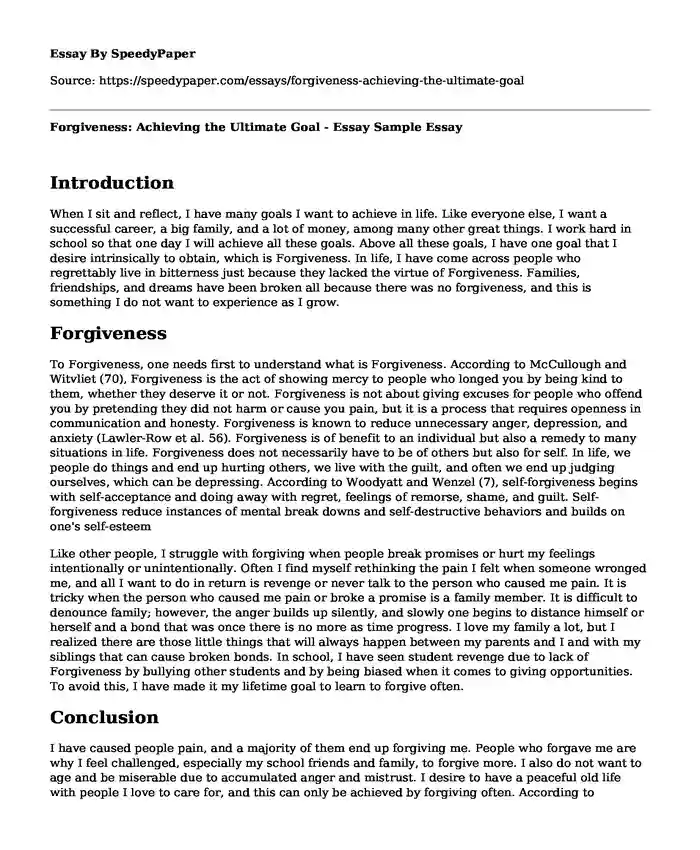
| Type of paper: | Essay |
| Categories: | Communication Psychology |
| Pages: | 3 |
| Wordcount: | 736 words |
Introduction
When I sit and reflect, I have many goals I want to achieve in life. Like everyone else, I want a successful career, a big family, and a lot of money, among many other great things. I work hard in school so that one day I will achieve all these goals. Above all these goals, I have one goal that I desire intrinsically to obtain, which is Forgiveness. In life, I have come across people who regrettably live in bitterness just because they lacked the virtue of Forgiveness. Families, friendships, and dreams have been broken all because there was no forgiveness, and this is something I do not want to experience as I grow.
Forgiveness
To Forgiveness, one needs first to understand what is Forgiveness. According to McCullough and Witvliet (70), Forgiveness is the act of showing mercy to people who longed you by being kind to them, whether they deserve it or not. Forgiveness is not about giving excuses for people who offend you by pretending they did not harm or cause you pain, but it is a process that requires openness in communication and honesty. Forgiveness is known to reduce unnecessary anger, depression, and anxiety (LawlerRow et al. 56). Forgiveness is of benefit to an individual but also a remedy to many situations in life. Forgiveness does not necessarily have to be of others but also for self. In life, we people do things and end up hurting others, we live with the guilt, and often we end up judging ourselves, which can be depressing. According to Woodyatt and Wenzel (7), self-forgiveness begins with self-acceptance and doing away with regret, feelings of remorse, shame, and guilt. Self-forgiveness reduce instances of mental break downs and self-destructive behaviors and builds on one's self-esteem
Like other people, I struggle with forgiving when people break promises or hurt my feelings intentionally or unintentionally. Often I find myself rethinking the pain I felt when someone wronged me, and all I want to do in return is revenge or never talk to the person who caused me pain. It is tricky when the person who caused me pain or broke a promise is a family member. It is difficult to denounce family; however, the anger builds up silently, and slowly one begins to distance himself or herself and a bond that was once there is no more as time progress. I love my family a lot, but I realized there are those little things that will always happen between my parents and I and with my siblings that can cause broken bonds. In school, I have seen student revenge due to lack of Forgiveness by bullying other students and by being biased when it comes to giving opportunities. To avoid this, I have made it my lifetime goal to learn to forgive often.
Conclusion
I have caused people pain, and a majority of them end up forgiving me. People who forgave me are why I feel challenged, especially my school friends and family, to forgive more. I also do not want to age and be miserable due to accumulated anger and mistrust. I desire to have a peaceful old life with people I love to care for, and this can only be achieved by forgiving often. According to Freedman and Zarifkar (27), Forgiveness gives one inner strength, confidence, and safety to move past life issues. Forgiveness challenges one to be open-minded and see people with their diversity and uniqueness and appreciating them, and it becomes hard to discredit those who hurt me unworthy. Also, virtues of courage and patience are nurtured in process forgiveness (LawlerRow et al. 45). The greatness is Forgiveness, and the happiness it brings to an individual and those around is why I want to make a lifetime goal.
Works Cited
Freedman, Suzanne, and Tiffany Zarifkar. "The psychology of interpersonal forgiveness and guidelines for forgiveness therapy: What therapists need to know to help their clients forgive." Spirituality in Clinical Practice 3.1 (2016): 45. https://doi.org/10.1037/scp0000087
LawlerRow, Kathleen A., et al. "Forgiveness and health: The role of attachment." Personal Relationships 18.2 (2011): 170-183. https://doi.org/10.1111/j.1475-6811.2010.01327.x
McCullough, Michael E., and Charlotte Vanoyen Witvliet. "The psychology of forgiveness." Handbook of positive psychology 2 (2002): 446-455.
Woodyatt, Lydia, and Michael Wenzel. "Self-forgiveness and restoration of an offender following an interpersonal transgression." Journal of Social and Clinical Psychology 32.2 (2013): 225-259. https://guilfordjournals.com/doi/pdfplus/10.1521/jscp.2013.32.2.225
Cite this page
Forgiveness: Achieving the Ultimate Goal - Essay Sample. (2023, Sep 12). Retrieved from https://speedypaper.com/essays/forgiveness-achieving-the-ultimate-goal
Request Removal
If you are the original author of this essay and no longer wish to have it published on the SpeedyPaper website, please click below to request its removal:
- Free Essay: Effects of Cheating in a Relationship on the Example of Zora Neale's Novel
- Failure for MBA - Personal Experience Essay Example
- Paper Sample for You to Check: Diversity, Communication, Old Age and Comfort
- Essay Sample on Utilizing Frames and Key Messages
- Paper Example. Road Trip to Toronto With the Girls
- The Hunger for More. Free Essay Example
- Interpersonal Communication Behavior Observed - Paper example
Popular categories




